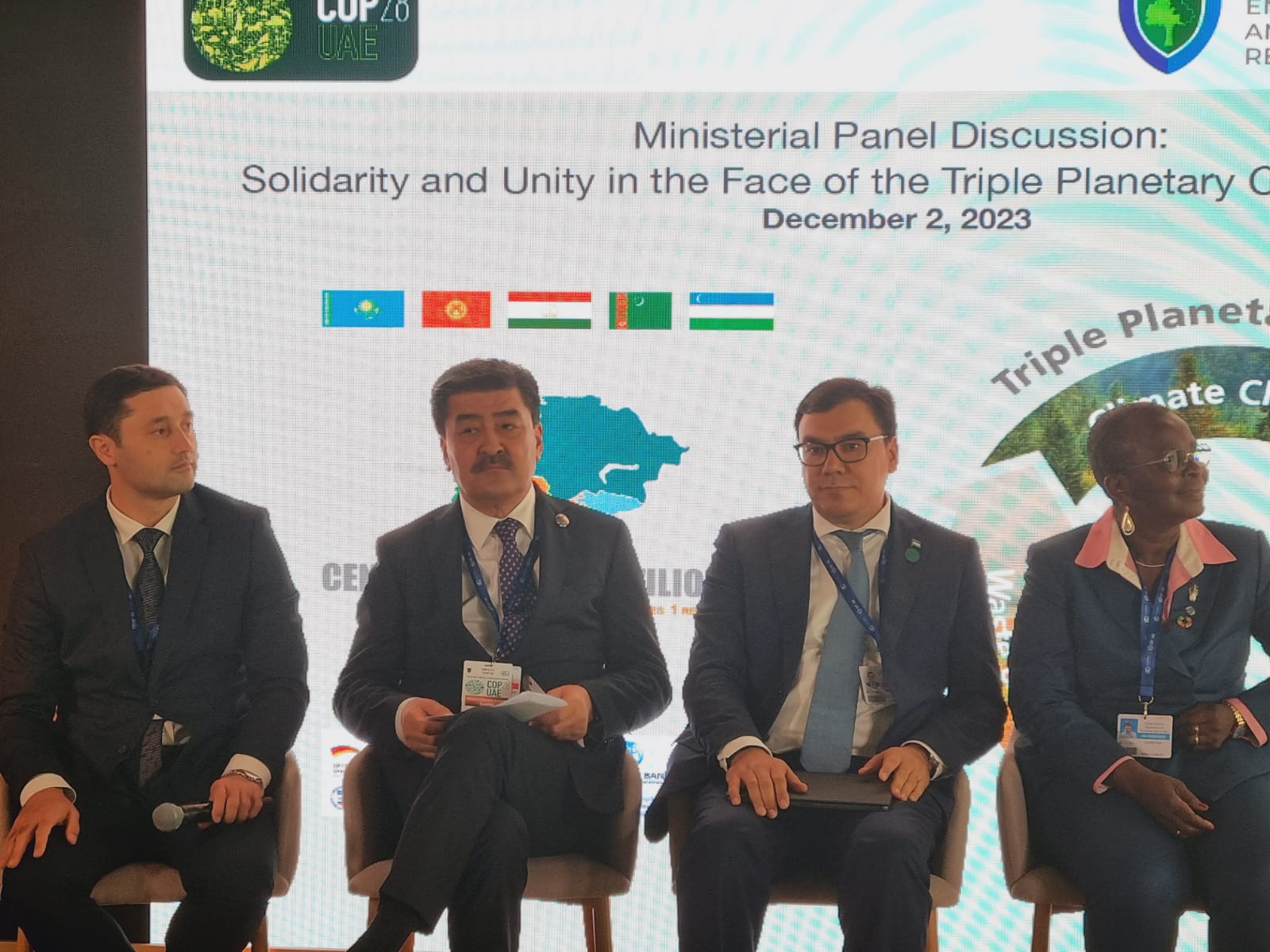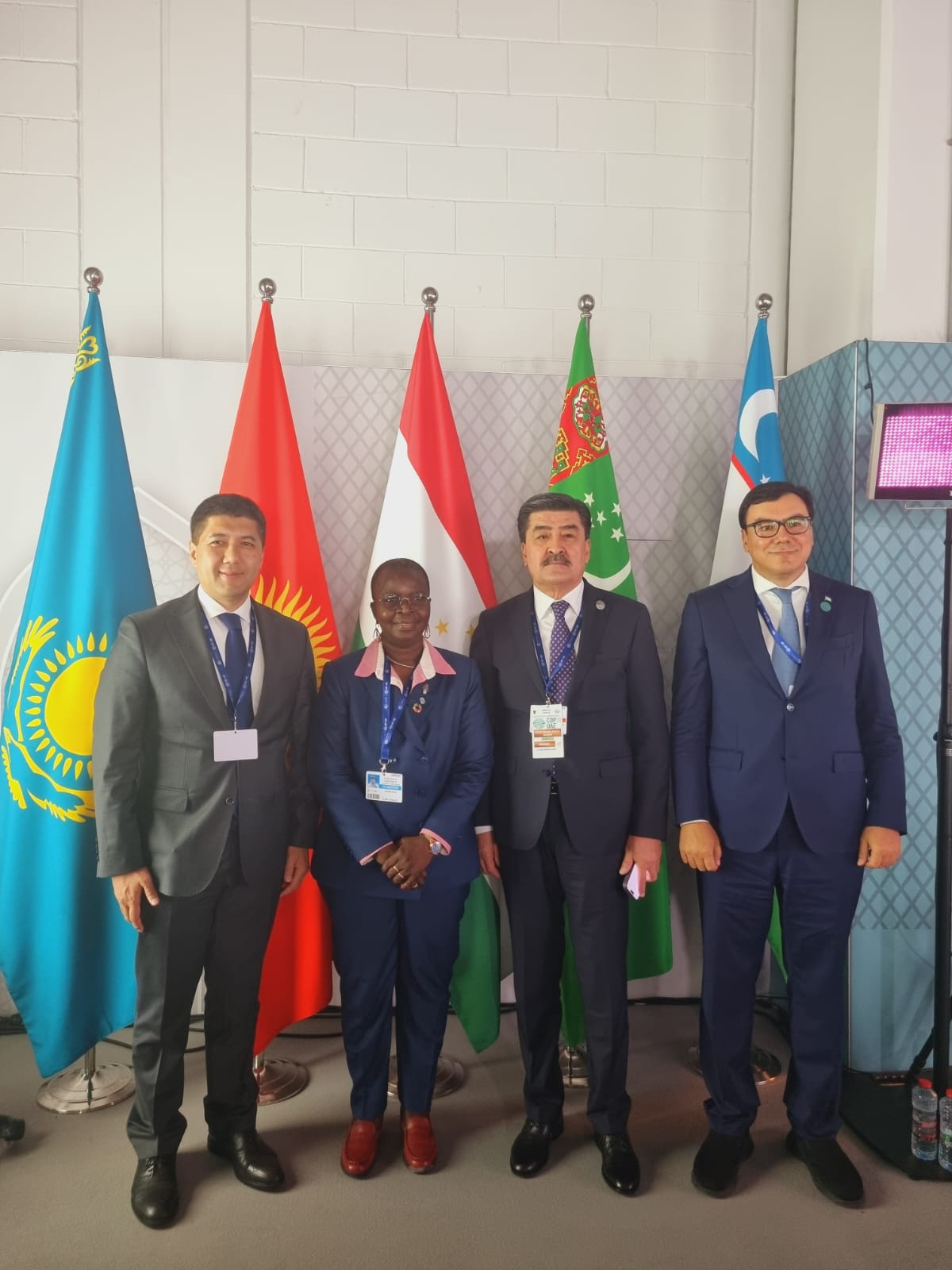Ministers of Central Asian countries on ecology and environment gathered at the Central Asian Pavilion at the high-level event “Solidarity and Unity in the face of the triple planetary crisis challenges”.
The event was organized by the Ministry of Ecology, Environmental Protection and Climate Change of the Republic of Uzbekistan.
The challenge of the triple planetary crisis includes biodiversity loss, waste pollution, and climate change. These three challenges affect the entire planet and all of humanity. The countries of Central Asia also cannot avoid these three global problems since the temperature in the region has risen by 1.5 degrees Celsius, twice the global average in the world.
Experts predict catastrophic consequences for the Central Asian region if the rise in temperature against the backdrop of climate change continues at the same pace. In this case, water availability per capita will decrease by 25%, and crop yields by 40%.
A serious consequence of the triple planetary crisis for the Central Asian countries was the tragedy of the Aral Sea. The drying up of the Aral Sea has led to the growth of heavy dust storms. Their annual volume reaches 100 million tons and affects areas up to 1,000 kilometers away. The Aral Sea has become a striking example of a transboundary environmental problem affecting the entire Central Asian region. It once again proves that nature, climate change, and ecosystems know no borders, so it is necessary to respond to the planetary crisis by building a constructive dialogue based on trust and cooperation.
The governments of the Central Asian countries are determined to address environmental problems at the regional level. The high-level meeting “Solidarity and Unity in the Face of the Triple Planetary Crisis Challenges” demonstrates the commitment of the countries of the region to strengthen regional dialogue, strengthen the representation of Central Asia on international platforms and create a joint framework for action.
The Central Asian states have already taken certain steps in confronting climate challenges. Countries have joined the Paris Agreement and made commitments to reduce greenhouse gas emissions.
The Minister of Ecology and Natural Resources of the Republic of Kazakhstan, Yerlan Nysanbayev, stressed that climate change invariably leads to economic losses, for example, they annually amount to 2% of GDP across the world. In confronting the triple planetary crisis, Kazakhstan is taking actions not only of a strategic but also of a practical nature. The country plants 2 billion trees to solve the problems of desertification, land degradation, biodiversity loss, and greenhouse gas reduction. A large-scale network of specially protected natural areas has been created. Its area comprises 10.7% of the country's territory.
In solving the problem of environmental pollution in Kazakhstan, the top 50 polluting enterprises have been identified, which are legally obliged to introduce new technologies to reduce emissions.
The Minister of Natural Resources, Ecology and Technical Supervision of the Kyrgyz Republic Melis Turgunbaev stressed that the planetary triple crisis hurts mountainous countries, including Kyrgyzstan. He noted that the rise in temperature in the republic leads to negative phenomena such as drought, uncharacteristic fluctuations in temperature regimes for the seasons, as well as, the melting of glaciers. The Kyrgyz Republic has developed modern glaciation, and all mountain ranges have hotbeds of climate change impacts.
Melis Turgunbayev noted that it is necessary to strengthen regional cooperation, building a constructive and fair dialogue aimed at sustainable management of transboundary water resources, ensuring food security and sustainable development of agriculture in the region.
The Minister of Ecology, Environmental Protection and Climate Change of the Republic of Uzbekistan Aziz Abdukhakimov raised such crucial issues for the region at the level of a triple planetary crisis as air pollution, loss of biodiversity in the territory of the Upper Aral Sea, where only salt and dust storms occur. Emphasizing the scale of common problems in the region, he noted that of the 70 million population of the Central Asian region, more than 30 million suffer from air pollution.
Aziz Abdukhakimov believes that the unification of the Central Asian countries is highly important for voicing their position, interests and ideas of the region at various international UN platforms. According to him, at the current Conference of the Parties, the Central Asian countries need to join the mechanism of the newly established fund for compensation for losses and damage. It is a good tool that can attract financial resources to the region to compensate for the damage caused by climate change. To do this, the Central Asian countries should act in a consolidated manner and be visible in voicing the region's problems. The share of the Central Asian region in the global greenhouse effect is insignificant, probably zero-point hundredths, but the region, like small island states, is the most affected by global warming.
In the Central Asian region, the temperature increase is higher than in the rest of the world, which hurts the economies and agriculture of the countries. At the same time, the countries of the region do not yet have sufficient financial readiness to respond to climate challenges. In this regard, the Loss and Damage Fund can support sustainable climate development in the region.
In turn, the Executive Director of the Regional Environmental Centre for Central Asia (CAREC), Zafar Makhmudov, noted that CAREC is ready to implement the initiative to create a Central Asian negotiating group to participate in the negotiation processes of the Conference of the Parties to the UNFCCC. He expressed hope that such a group will already work on the negotiation processes at the next 29th Conference of the Parties to the UNFCCC.
Videorecording is at https://www.youtube.com/watch?v=BBXJOGOulEQ
Central Asia Pavilion “5 countries – 1 region – 1 voice” is organized by the Regional Environmental Centre for Central Asia (CAREC) in cooperation with the Governments of Central Asian countries under financial support of the GIZ, OSCE, the World Bank, USAID, the European Union, and the Food and Agriculture Organization of the United Nations (FAO).
Zhanna Husainova


